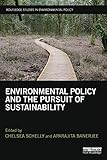Environmental Policy and the Pursuit of Sustainability / Chelsea Schelly.
Material type: TextLanguage: English Publication details: Abingdon : Routledge, 2018.Edition: 1st edDescription: xv, 212 p.: ill. ; 22 cmISBN:
TextLanguage: English Publication details: Abingdon : Routledge, 2018.Edition: 1st edDescription: xv, 212 p.: ill. ; 22 cmISBN: - 9781138296510
- 9781138296503
- 9781315099996
- Environmental Policy and the Pursuit of Sustainability
- 23 363.70561 SCH
| Item type | Current library | Collection | Call number | Status | Date due | Barcode |
|---|---|---|---|---|---|---|
 Text Books
Text Books
|
CUTN Central Library Social Sciences | Non-fiction | 363.70561 SCH (Browse shelf(Opens below)) | Available | 47695 |
Introduction: When One Size Does Not Fit All: Environmental Policy, Social Context, and Social Justice
PART 1: Water, Water Management, and Adaptation to Changing Water Landscapes
Chapter 1: Nutrient Trading Credits: Best Management Practices and Policy Hurdles for Non-Point Source Polluters in the Chesapeake Bay
Chapter 2: Water Management in the Upper Klamath Basin: Collaboration and Polarization
Chapter 3: Toward a Whole-of-Government and Whole-of-Community Approach for Regional Adaptation to Sea Level Rise: Lessons Learned from the Hampton Roads Intergovernmental Pilot Project
PART 2: Land Management and Land Use
Chapter 4: U.S. Public Lands and a New Administration: New and Old Issues
Chapter 5: Perceptions of Contentiousness: How Individual Traits Shape Environmental Policy Conflicts
Chapter 6: Solid Waste Governance: Consumption and Culture in the Globalization Era
PART 3: Human Health and Well-Being
Chapter 7: Where is the Justice? An Examination of the Failure of the US EPA Office of Civil Rights to Ensure Environmental Justice for Poor and Minority Communities
Chapter 8: The Power of the Talking Points: Persuasive Power and the Challenges of Sustainable Natural Resource Development
Chapter 9: Social and Political Inequality as Challenges in Technology Diffusion: Evidence from Government-Funded Improved Cookstove Program in Rural Mexico
PART 4: Resilience
Chapter 10: The Role of Voluntary Agreements in a Hybrid Model of Environmental Law Enforcement
Chapter 11: Institutional Barriers to Managing Dynamic Landscapes: Lessons Learned in Southwestern Colorado
Chapter 12: The Long Road to Sustainability of Mexican Oil Palm Production
Conclusion: Environmental Policy and Pursuit of Just Sustainability
It is increasingly apparent that human activities are not suitable for sustaining a healthy global environment. From energy development to resource extraction to use of land and water, humans are having a devastating effect on the earth’s ability to sustain human societies and quality lives. Many approaches to changing the negative environmental consequences of human activities focus on one of two options, emphasizing either technological fixes or individual behavior change to reduce environmental harms through sustainable consumption habits. This book takes a different approach, focusing on the role of environmental policy in shaping the possibilities for and creating hindrances to pursuing more sustainable use of environmental resources.
This unique compilation examines environmental policy through empirical case studies, demonstrating through each particular example how environmental policies are formed, how they operate, what they do in terms of shaping behaviors and future trajectories, and how they intersect with other social dynamics such as politics, power, social norms, and social organization. By providing case studies from both the United States and Mexico, this book provides a cross-national perspective on current environmental policies and their role in creating and limiting sustainable human futures.
Organized around four key parts – Water; Land; Health and Wellbeing; and Resilience – and with a central theme of environmental justice and equity, this book will be of great interest to students and scholars of environmental policy and sustainability.


There are no comments on this title.